If you’ve never felt the need to cleanse your social media history, perhaps today will be the day.
Within the past weeks, two featured WWE performers — NXT’s Mandy Rose and SmackDown’s soon-to-return Lacey Evans — posted content that some might consider objectionable and inconsistent with their employer’s brand, for very different reasons.
In Rose’s case, her decision to upload explicit sexual content to a private paid website led her to drop her NXT Women’s championship to the first available contender on December 13 and resulted in her release the next day. Before this, Rose had become a successful NXT reclamation project. Rose joined WWE in 2015 after placing second in the WWE Network’s rebooted Tough Enough. She soon joined the Total Divas cast and after a brief first stint in NXT was promoted to the main roster in 2017 alongside Sonya Deville in Paige’s Absolution faction. For the next three years, Rose would be better known for her appearance than her matches. In 2021 she would finally take off. She was sent back to NXT and started her own team with Gigi Dolin and Jacy Jayne-Toxic Attraction-and would defeat Raquel Gonzalez (now Rodriguez) to win the NXT Women’s Championship. Rose had put together a solid 400-plus day reign and seemed unlikely to lose the title, until life both real and on-line intervened.
Evans’ social media activity was far less racy but offensive to rational thinking people. On December 20 Evans shared a poorly produced video to her Instagram account which set out a series of bizarre and unscientific conspiracy theories about autism and Attention Deficit Disorder, linking these diagnoses to the increase in consumption of processed food since the 1980s. Evans went on to defend this malarkey on her Twitter account before deleting it all. As far as I know, Evans still has a job, but it’s unlikely that her posting will help her return to action from the latest in a series of unsuccessful attempts to repackage her character.
The two cases are very different in their content and results. The jury is out on what if any effects Evans’ postings will have on her career, but other superstars who have advanced anti-science positions on social media have seen their fortunes decline, as we will soon see. What’s interesting is how these cases represent the latest in a long line of incidents where wrestlers have harmed their own careers and the role that technology including social media has played in their downfall.
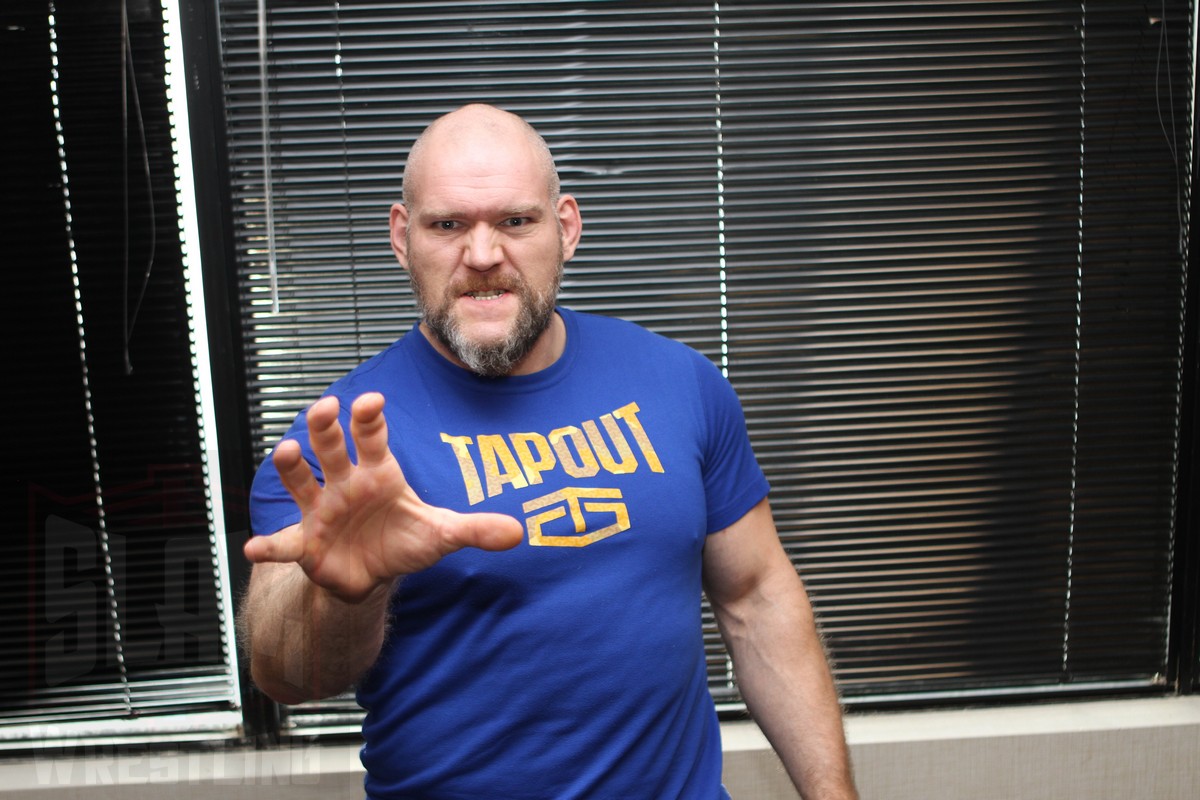
Lars Sullivan at the Legends of the Ring fan fest on Saturday, October, 2, 2021, at the Apa Hotel, Iselin, NJ. Photo by George Tahinos, https://georgetahinos.smugmug.com
Before Rose and Evans altered the course of their careers independently, Lars Sullivan beat both to the punch. Sullivan was positioned as a monster heel in NXT and seemed destined for a massive push on the main roster, including a proposed SummerSlam match against John Cena. These pushes were derailed by a combination of ill-timed injuries and online shenanigans. In May 2019, a series of racist, sexist, homophobic and otherwise offensive posts by Sullivan were uncovered on an online bodybuilding forum going back to 2007 and including posts written while under contract to WWE. Five months later, video surfaced of Sullivan’s work in adult films before his WWE tenure. Citing ongoing anxiety issues, Sullivan requested his release from WWE in January 2021, long after he’d last been seen on television.
Jaxson Ryker had legitimately served in the Iraq War as a Marine and wrestled professionally since 2001. He scored his first big break with TNA as muscle for the Immortal stable and would have a long run in that promotion. He signed with WWE in 2017 and by February 2018 had joined fellow veterans Wesley Blake and Steve Cutler in the Forgotten Sons faction. The group would finally make the main roster in April of 2020, leaning heavily on their military backgrounds and making their way up the card. Their momentum stopped dead when Ryker tweeted his support for then-President Donald Trump and against the Black Lives Matter movement following the death of George Floyd. Ryker labelled the movement “garbage.” Despite his assertions to the contrary, an increasingly diverse wrestling audience and locker room saw his comments as racist. By December 2020, the group was split up, and Wesley and Cutler (who would have his own social media problems, after posting photos of himself unmasked at a party alongside fellow wrestler Deonna Purrazzo) would be released a few months later despite disavowing Ryker’s comments. Ryker would surprisingly resurface as Elias’ flunky on Raw (I guess Ezekiel wasn’t available) for a brief run before an extended stint losing on Main Event before his own release in November. Ryker’s return to the independent scene has been underwhelming. He has openly complained on social media that he has had difficulty securing bookings and has been removed from shows over his use of social media, where he continues to broadcast his religious beliefs and views of contentious social issues.
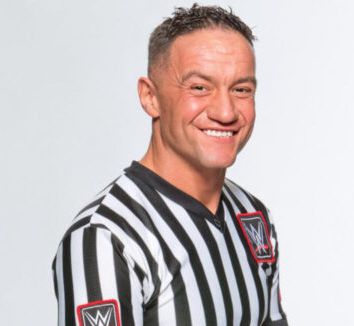
Drake Wuertz
Less high profile but more bizarre in terms of content, independent wrestling stalwart and former NXT Head Referee Drake (Younger) Wuertz was released from his contract in May 2021, when a Zoom video surfaced of him making a series of wild claims regarding mandatory mask-wearing for COVID at a meeting of Seminole Country Board of County Commissioners. Wuertz also skipped work at NXT to participate in a meeting of his local public school board, where he argued that wearing a mask in school would help child predators, and described himself on his social media accounts as “an extremist for Christ.” Apart from allegations that he was critical of WWE’s policies around COVID vaccinations and intolerant of other faiths, Wuertz was found to have used his WWE corporate email address to support organizations linked to the QAnon movement. Wuertz isn’t unique in his views, and he attempted to parlay his support online into a run for the Florida Legislature as a Republican, even as he sought to distance himself from his most extreme positions.
It’s also worth noting that extreme positions taken on social media can haunt a wrestler’s career for years after the fact. I’ll get to the mug shots and arrests which have been preserved online a bit later, but recently Brian Kendrick was caught out for a series of racist conspiracy theories he’d posted to Twitter and in a series of online interviews between 2011 and 2013. Kendrick was apparently known backstage for harboring these views, and whether WWE failed to notice them or simply ignored them Kendrick remained on the payroll until January 2022. He was immediately advertised to appear in AEW before his past remarks surfaced (which is interesting timing in itself). Once AEW owner Tony Khan found out, he quickly rescinded his offer to Kendrick. Kendrick himself later posted on social media trying to distance himself from his comments, but for many who read them it was far too little too late. I can understand that people occasionally say stupid or hurtful things online, but leaving them unchecked until they get caught out shows cowardice, not growth. Inexplicably, Kendrick was recently brought back to WWE as a one-off at Ronda Rousey’s request, to help produce her match with Shotzi Blackheart. The match sucked.
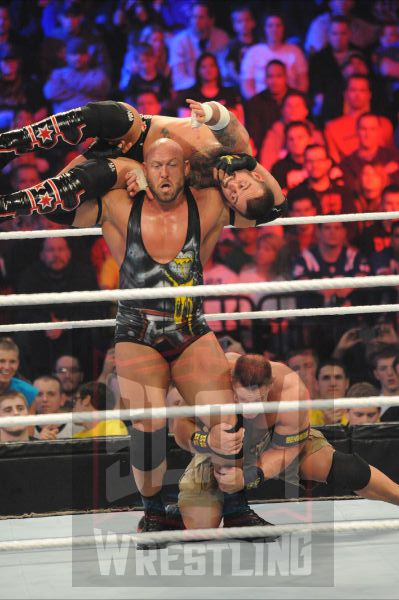
Ryback has CM Punk in his arms as John Cena goes after his legs at Survivor Series 2012. Photo by Mike Mastrandrea, www.mikemastrandrea.com
Ryback continues to maintain a weird and often controversial social media presence-going so far as to suggest that Vince McMahon’s mother was a sex worker. Then on December 23 he stated: “I don’t condone anything @wwe and @VinceMcMahon have done in terms of things while I was there and the last 6.5 years of walking away. I stand by the things I’ve said, but do apologize for referencing his mother with what I said. I met her & she was beyond kind to me. Sorry Vicky”
Whether he anticipated this column or not, his attempt to make amends should be called out. It will likely not receive anywhere near the attention that his earlier, angry and hurtful remarks did. Wrestlers should have learned from Rick Rude in his feud with the Big Boss Man that you don’t go after someone’s mother.
In May 2013, it was revealed that Ryback would not appear on television following a contract dispute. Ryback used his personal Tumblr account to refute that story and launched into an argument about WWE’s compensation structure. Ryback argued publicly that WWE pays wrestlers who win more than those who frequently lose their matches, which would make sense if pro wrestling matches were legitimate athletic contests but is unfair in an environment where WWE itself determines match outcomes. Ryback argued that where performers make up part of a larger troupe it would be better to pay all wrestlers equally. While he understood that ‘winners’ would make more money via things like merchandise sales or pay-per-view slots, he saw this arrangement as unfair to those who facilitate their staged victories and were thus less likely to have merchandise made or appear on bigger shows — and a perversion of the idea that wrestlers should embrace others’ success since that success would pave the way to their own release. With this salvo Ryback would claim that he had decided to leave WWE. On August 5 he followed this up with an Instagram announcement that he had in fact left, which WWE confirmed three days later.
Ryback’s argument is appealing at first; if WWE performers’ contracts are laden with incentives based on things like pay-per-view appearances or percentages of merchandise sales, it does seem unfair that WWE can control these levers based on how those performers are booked. A wrestler like John Cena who was regularly featured on WWE programming and pushed to win would always stand a better chance of having merchandise made or appearing on big shows since he was a product of WWE’s own hype machine, a positive feedback cycle. By contrast, lower card wrestlers would be less likely featured on broadcasts, positioned as cannon fodder for top guys and have fewer merchandise items made, and their lower deals would become self-fulfilling prophecies since lower revenues attached to their characters could impact future contract negotiations. On rare occasions, talent may ‘get itself over’ (Zack Ryder being a notable example who has turned his organic popularity and hustle to a strong run on the independent scene), but without solid promotional backing these streaks burn themselves out.
Think about it this way: Bob Holly signed with WWE in 1994 and lasted until 2009. He was a lifelong lower-to-mid card wrestler and claims in his autobiography that he never earned more than $150,000 a year. Another well-muscled blond wrestler with thinning hair and a Southern accent joined WWE in 1995 following middling runs elsewhere, and retired in 2003. Today Stone Cold Steve Austin is worth an estimated $30 million. His T-shirts are still produced and he just headlined WrestleMania in his mid-50s. While I wouldn’t argue that the two men are equals in-ring or on the mic, their presentation was close enough that the disparity in earnings stands out. There but for the grace of Vince, it’s not outside the realm of thought that middle-aged dads could be wearing “Big Shot” t-shirts and looking forward to Kevin Owens taking an Alabama Slam.
Then again, Ryback’s complaints about earning potential being undermined by promoters’ whims ring hollow when we consider that professional wrestling is an entertainment business. Hollywood is full of stories where actors get mired in contract disputes and the show goes on without them. In the Disney movie Hercules the part of Hades was originally written for Jack Nicholson. He countered an offer for up to $1 million with a demand for $15 million and the part went to James Woods, who redefined it with an awesome manic energy. The rebooted Hawaii Five-0 TV series saw significant cast changes after its seventh season, when supporting actors Daniel Dae=Kim and Grace Park left the series following a salary dispute. The two actors (who were also based on supporting characters in the original show) sought equal pay with top-billed cast members Alex O’Loughlin and Scott Caan, and argued they were being paid less because of their ethnic backgrounds. The producers balked and their characters were written out of the series. That’s show business.
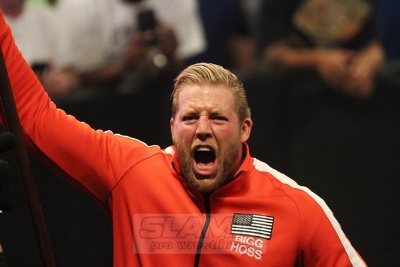
When he was Jack Swagger.
It all makes one long for a good, old-fashioned arrest for drug possession. Before he discovered a personality in Chris Jericho’s magic hat on AEW Dynamite (much like Frosty the Snowman) Jake “Jack Swagger” Hager was poised for a WWE World Championship run with his “We the People” gimmick. Hager was always a solid wrestler but a charisma vacuum. Pairing him with Dutch Mantell as Zeb Colter as a pair of arch-Conservative heels was a masterstroke. Mantell cut political promos that played off tensions in American society, which have only gotten worse since. Swagger and Colter’s act was so inflammatory it drew the ire of right-wing political commentators who saw it as mocking the Tea Party movement. Hager should have stuck with tea. On the eve of a possible World Title victory at that year’s WrestleMania Hager was arrested for Driving Under the Influence and possession of marijuana; his mugshot would be splashed all over the gossip site TMZ and elsewhere, and he was swiftly pushed back down the card. Hager has had some success in mixed martial arts for Bellator but his pro wrestling career has never recovered.
Before Hager’s arrest Rob Van Dam was one of the most successful acts to come out of the ill-fated WCW/ECW Alliance ‘invasion’ angle. At WrestleMania 22, Van Dam won the Money in the Bank Ladder Match and then beat John Cena for the WWE Championship at ECW One Night Stand in June 2006. He would also receive the reactivated ECW World Championship. His reign would be short lived. He would lose both belts between July 3 and 4 after a public arrest for drug possession. Van Dam remains a popular performer and held plenty of titles elsewhere — and given the nature of his gimmick, an arrest for marijuana wasn’t going to hurt his appeal to his fan base.
The granddaddy of these cases lives on in wrestling infamy due to Google. In 1987, the Iron Sheik and “Hacksaw” Jim Duggan were suspended (and Duggan was actually fired for a while) after being charged with drug possession in New Jersey. The arresting officer had seen Duggan drinking beer in the car, and a search uncovered marijuana in his possession. Sheik was found to have cocaine in his luggage as well. Of course, the bigger scandal was that these two sworn enemies were travelling together at a time when kayfabe was a going concern. By this point Sheik was on his way out as a top tier performer; he was 44 and substance abuse had begun catching up to him on other fronts. Duggan was a relatively new signing, and there had been talk of positioning him as a headlining babyface waiting in the wings depending on what happened to champion Hulk Hogan. Duggan would return to WWE but in a diminished role. He would often be positioned as the first ‘name’ wrestler that new heels would destroy on their march to main events against the Hulkster.
Hulk Hogan’s inclusion in this column may be ironic; of everyone in this article his greatest takeaway from his own series of sex and racism scandals was that wrestlers should be careful about what they post online. His own response to various scandals leaked online has largely been to shoot the electronic messenger, an awful misread of the WWE Universe which has hampered the last few attempts to bring him out for a cheap pop.
Outside of WWE, plenty of wrestlers have submarined their careers through a combination of bad actions, worse attitudes and incredibly stupid comments. I’ll leave an exhaustive list for others, but note that alleged predators like Joey Ryan, David Starr, Michael Elgin and Marty Scurll saw their careers irrevocably damaged by allegations of sexual misconduct raised online. These allegations are all serious and if true, use of social media by their victims are a service to the pro wrestling community. The absence of a trier of fact or the opportunity to raise a proper defense to these allegations is problematic; but their clumsy online attempts to justify their behavior proved damning in their own right.
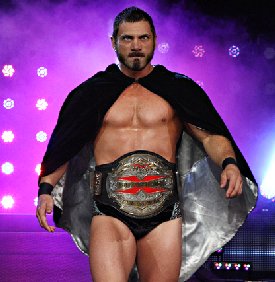
Austin Aries as TNA X Division champion.
Austin Aries has long been recognized as a gifted in-ring performer. He is one of a handful of men to be a multiple time ROH World champion and has also held the TNA Heavyweight championship. He also enjoyed a lukewarm cup of coffee in WWE. Aries’ attitude has gotten him into trouble on more than one occasion. He quit Twitter in March 2021, after claiming that more people were dying from vaccines from the COVID-19 pandemic. He has resurfaced in smaller promotions, and with the departures of Karrion Kross and Braun Strowman (himself no stranger to inopportune Twitter comments) is part of EC3’s struggling Control Your Narrative enterprise.
Teddy Hart had as much potential as anyone in wrestling; at one point he was the youngest developmental signing in WWE history, but decades of erratic performances, unsafe spots and criminal behavior have rendered him radioactive. A recent documentary available on NBC’s Peacock streaming service (ironically also home to the WWE Network) attempts to implicate him in a missing person’s case.
Tessa Blanchard comes from a similarly venerated wrestling family and was building a remarkable career that saw her win the Impact World Championship. A seemingly innocent tweet where she called for unity among female performers ignited a firestorm of accusations of bullying and racist behavior. She has wrestled thrice since September 2020 and seems to be eyeing a career outside of wrestling.
AEW is still a new enough property that its scandals are the more pedestrian, out-of-control-promos-leading-to-backstage-biting kind, but after signing with the promotion in late 2019, Big Swole announced her exit via social media, trashing AEW for a lack of corporate infrastructure and commitment to diversity. AEW owner Tony Khan fired back that he let her contract expire given her own performance issues. Similar to Ryback, who broadcast his own dissatisfaction with his contract on social media, Swole has yet to catch on with another promotion of significance.
I’m as addicted to social media as the next internet wrestling columnist, but I have to admit that I find the breathless reporting of tweets and Instagram posts as ‘news’ is exhausting and does a disservice to those who try to read media critically. The flood of disinformation that tries to make real historical events or scientific facts (see Earth, flat) into subjects for ‘discussion’ takes bandwidth (literal and figurative) away from really important issues. The largely unregulated marketplace of ideas created by forums like Twitter, TikTok or Instagram amplifies those with outlying beliefs, since it’s easy for anyone to find a community of like-minded trolls. Those who post indiscriminately or in line with their own counterfactual world views are quick to complain that they are ‘cancelled’ after broadcasting their silliness. I’m not sure I buy the argument in every case. Sometimes (Evans’ or Ryker’s, for example) the response they’ve received is the market at work. We all have the right to voice our opinions, but we are not owed an audience. If our views are isolating enough it stands to reason that people won’t want to work with us. That too, is show business.
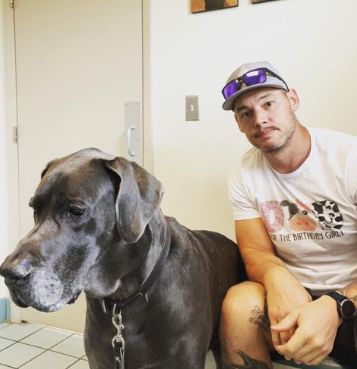
Baron Corbin on Instagram.
While I’ve focused on the toxic aspects of social media in pro wrestling, it’s worth noting that many performers have leveraged it effectively. Baron Corbin’s Instagram account is presented semi in character, but it shows a slice of his ‘real’ home life and highlights his love of cooking, scotch and watches — all hobbies with which I relate. On TV Corbin has never come across as more than a 2D caricature of an old-school wrestling bad guy. Online his image is more relatable. I’m almost a fan. Mick Foley has long used his social media platforms to advance the political and charitable causes that he supports and has raised awareness and money for a variety of issues. Foley recently left Twitter following Elon Musk’s controversial acquisition; whether you agree with any of the politics involved or not, at least he’s consistent in his beliefs. Sami Zayn has established his own non-profit “Sami for Syria”, which provides medical and other help to parts of the Middle East.
When social media platforms first emerged, their champions were quick to point out how democratizing they could be. What they failed to predict was the lack of critical thinking that goes into so much of what is produced, and what we read. Going through this sample of cases (and there are many more) it’s possible to group the different ways that wrestlers and anyone can get themselves in trouble and do lasting damage to their careers. In rare cases it’s possible to improve their stock. Matt Cardona crowned himself the Internet Champion (complete with a belt featuring the MySpace logo) and continues to make himself relevant outside of mainstream TV. Impact saw what he did and created an actual digital media championship. Countless indy wrestlers leverage these channels to build a fan base off of their characters; a few, like Danhausen, even leverage that into contracts with larger promotions. It makes them instantly recognizable without the bone-breaking body of work that comes with life on the road. Social media helped keep wrestling alive during the COVID pandemic, when we were all stuck at home on our computers … but COVID also helped reveal an ugly side to the content that many choose to share, and should serve as a lesson to everyone to be careful what you post online now, then and forever.
This is why I reserve my social media accounts for silly wrestling memes.
TOP PHOTO: Mandy Rose in a special Christmas-themed photo shoot, post-WWE release. Twitter photo
RELATED LINK

